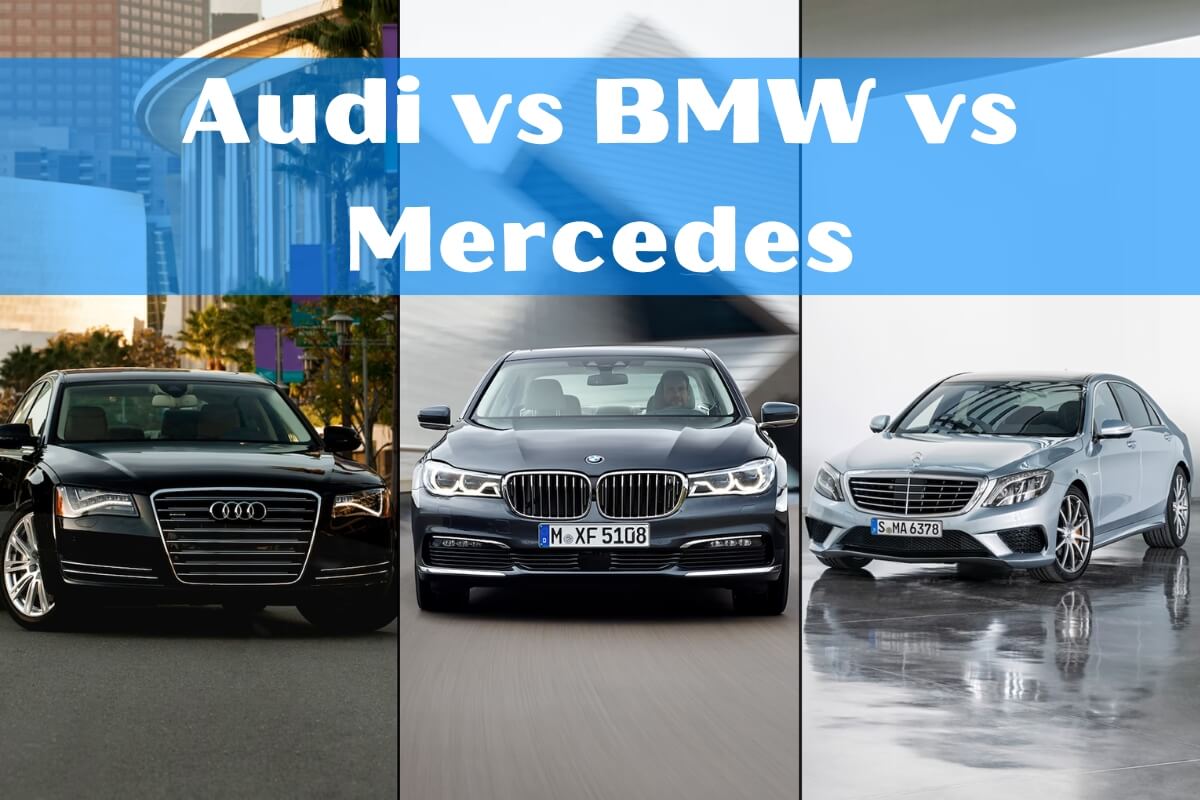Audi vs BMW vs Mercedes: Luxury Car Showdown

When shopping for a luxury car, three names stand out: Audi, BMW, and Mercedes-Benz. But which one is right for you? We’ll compare these German giants, exploring their strengths and weaknesses in design, performance, tech, pricing, and more. Read on to make an informed choice.
A Brief History of the Luxury Titans
Before we compare the brands, let’s briefly explore their origins and evolution.
Audi traces its roots back to 1910 when its founder, August Horch, established the company under the name “Audi Automobilwerke.” Over the years, Audi has become known for its innovative technology, such as the revolutionary Quattro all-wheel-drive system, and its emphasis on balanced performance and luxury.
BMW, or Bayerische Motoren Werke, started as an aircraft engine manufacturer in 1916. The company transitioned into the automobile industry in 1928, and since then, it has built a reputation for producing high-performance vehicles that prioritize driving pleasure.
Mercedes-Benz is the oldest of the three, with its origins dating back to 1886 when Karl Benz patented the first gasoline-powered automobile. The brand has long been synonymous with luxury, innovation, and uncompromising quality.
Design and Styling: A Matter of Taste
When it comes to design and styling, each brand has a distinct philosophy that appeals to different tastes.
Audi’s design language is characterized by minimalism and angular lines, resulting in a sleek and modern aesthetic. The brand’s vehicles exude a sense of sophistication and understated elegance.
In contrast, BMW’s design philosophy revolves around sharp, dynamic lines and the iconic kidney grille. The brand’s vehicles have a sporty and aggressive appearance, reflecting their focus on performance.
Mercedes-Benz, on the other hand, prioritizes elegance and sophistication in its designs. The brand’s vehicles feature graceful curves and a classic grille design that exudes luxury and timeless style.
Performance and Driving Dynamics
While all three brands offer high-performance vehicles, their approaches to driving dynamics differ.
BMW’s marketing slogan, “Sheer Driving Pleasure,” encapsulates the brand’s emphasis on providing an engaging and thrilling driving experience. From the legendary M series to the powerful X5 M, BMW’s vehicles are designed to deliver exceptional handling, responsiveness, and power.
Audi strikes a balance between performance and luxury. The brand’s Quattro all-wheel-drive system enhances traction and stability, while its turbocharged engines deliver impressive acceleration. However, Audi’s focus is on providing a well-rounded driving experience that combines performance with comfort and refinement.
Mercedes-Benz leans more towards comfort and refinement than outright performance. While the brand’s AMG line caters to enthusiasts with high-powered engines and sporty suspensions, the majority of Mercedes-Benz vehicles prioritize a smooth and luxurious ride quality.
Technology and Innovation
In the realm of technology and innovation, all three brands offer advanced features and systems.
Audi is renowned for its cutting-edge technologies, such as the Virtual Cockpit display, which replaces traditional gauges with a high-resolution digital display. The brand’s MMI infotainment system is also praised for its user-friendly interface and seamless integration with various applications.
BMW’s iDrive system is widely regarded as one of the most intuitive and user-friendly infotainment systems in the industry. Additionally, the brand offers advanced driver-assist technologies, such as adaptive cruise control and lane-keeping assist, to enhance safety and convenience.
Mercedes-Benz’s COMAND system is feature-rich and offers a wide range of functionalities. The brand also excels in exclusive amenities, such as the available Burmester sound system and the Airmatic air suspension, which provide a truly luxurious driving experience.
Pricing and Value Proposition
When it comes to pricing, there is a notable difference among these three brands.
Audi generally offers a more affordable entry point into the luxury car market, with its base models starting at a lower price point compared to BMW and Mercedes-Benz. However, as you move up the trim levels and opt for higher-performance models, the price gap narrows.
BMW’s pricing tends to fall in the middle ground, with its vehicles often positioned as a balance between performance and affordability within the luxury segment.
Mercedes-Benz commands a premium price tag, reflecting its long-standing reputation for luxury and prestige. While the brand’s entry-level models are more expensive than their Audi and BMW counterparts, the higher-end models offer a level of exclusivity and refinement that justifies the premium pricing.
Brand Reputation and Customer Satisfaction
Brand reputation and customer satisfaction are crucial factors to consider when choosing a luxury vehicle.
Audi has cultivated a reputation for offering a balanced blend of performance, luxury, and technology. The brand’s vehicles are often praised for their well-appointed interiors and attention to detail.
BMW’s reputation is firmly rooted in its “Ultimate Driving Machine” ethos. The brand is renowned for producing vehicles that prioritize driving dynamics and performance, appealing to enthusiasts and thrill-seekers alike.
Mercedes-Benz’s reputation as a symbol of luxury and status is unparalleled. The brand is associated with elegance, refinement, and a level of exclusivity that has been maintained for over a century.
Model Lineup and Trim Levels
Each brand offers a diverse range of models and trim levels to cater to different preferences and budgets.
Audi’s lineup includes the compact A3, the midsize A4 and A6, and the flagship A8 sedans, as well as various SUVs and high-performance models like the RS series. The brand also offers the innovative e-tron electric vehicle line.
BMW’s model range encompasses the iconic 3 Series, the luxurious 7 Series, and the X Series of SUVs. Additionally, the brand’s M division produces high-performance variants like the M3 and M5, catering to driving enthusiasts.
Mercedes-Benz’s lineup includes the compact A-Class, the midsize C-Class and E-Class, and the flagship S-Class sedans, as well as a range of SUVs and coupes. The brand’s AMG division offers high-performance variants, such as the AMG GT and AMG G-Class, for those seeking uncompromising power and performance.
Final Checkpoint
In the battle of Audi vs. BMW vs. Mercedes-Benz, there is no clear winner. Each brand excels in its own unique way, catering to different preferences and priorities.
If you value a balanced blend of performance, luxury, and cutting-edge technology, Audi might be the right choice for you. If driving pleasure and a thrilling experience behind the wheel are your top priorities, BMW’s “Ultimate Driving Machine” philosophy could resonate with you.
However, if you’re drawn to the allure of timeless elegance, uncompromising luxury, and a long-standing reputation for quality, Mercedes-Benz might be the brand that captures your heart.
Ultimately, the decision comes down to your personal preferences, lifestyle, and budget. Explore each brand’s offerings, take test drives, and determine which one aligns best with your needs and desires.
Remember, the choice between Audi, BMW, and Mercedes-Benz is a personal one, and there’s no one-size-fits-all answer. Whichever brand you choose, you’ll be driving a vehicle that embodies the pinnacle of German engineering and luxury.






